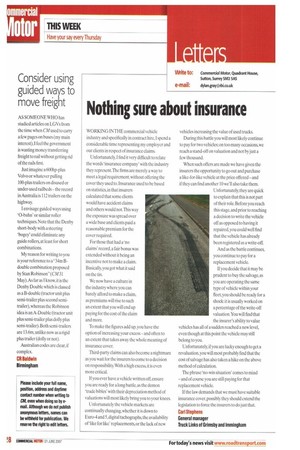Nothing sure about insurance
Page 28

If you've noticed an error in this article please click here to report it so we can fix it.
WORKING IN THE commercial vehicle industry and specifically in contract hire, I spend a considerable time representing my employer and our clients in respect of insurance claims.
Unfortunately, I find it very difficult to relate the words 'insurance company' with the industry they represent.The firms are merely a way to meet a legal requirement, without offering the cover they used to. Insurance used to be based on statistics, in that insurers calculated that some clients would have accident claims and others would not.This way the exposure was spread over a wide base and clients paid a reasonable premium for the cover required.
For those that had a 'no claims' record, a fair bonus was extended without it being an incentive not to make a claim. Basically, you got what it said on the tin.
We now have a culture in the industry where you can barely afford to make a claim, as premiums will rise to such an extent that you will end up paying for the cost of the claim and more.
To make the figures add up, you have the option of increasing your excess — and often to an extent that takes away the whole meaning of insurance cover.
Third-party claims can also become a nightmare as you wait for the insurers to come to a decision on responsibility. With a high excess, it is even more critical.
If you ever have a vehicle written off, ensure you are ready for a long battle, as the demon 'trade bibles' with their depreciation method of valuations will most likely bring you to your knees.
Unfortunately the vehicle markets are continually changing, whether it is down to Euro-4 and 5, digital tachographs, the availability of 'like for like' replacements, or the lack of new vehicles increasing the value of used trucks.
During this battle you will most likely continue to pay for two vehicles; on too many occasions, we reach a stand-off on valuation and not by just a few thousand.
When such offers are made we have given the insurers the opportunity to go out and purchase a like-for-like vehicle at the price offered — and if they can find another 10 we'll also take them.
Unfortunately, they are quick to explain that this is not part of their role. Before you reach this stage, and prior to reaching a decision to write the vehicle off as opposed to having it repaired, you could well find that the vehicle has already been registered as a write-off And as the battle continues, you continue to pay for a replacement vehicle.
If you decide that it may be prudent to buy the salvage, as you are operating the same type of vehicle within your fleet, you should be ready for a shock: it is usually worked on a percentage of the write-off valuation.You will find that the insurer's ability to value vehicles has all of a sudden reached a new level, even though at this point the vehicle may still belong to you.
Unfortunately, if you are lucky enough to get a revaluation, you will most probably find that the cost of salvage has also taken a hike on the above method of calculation.
The phrase 'no-win situation' comes to mind — and of course you are still paying for that replacement vehicle.
If the law demands that we must have suitable insurance cover, possibly they should extend the legislation to force the insurers to do just that.
Carl Stephens General manager Truck Links of Grimsby and Immingham
























































































































































































































